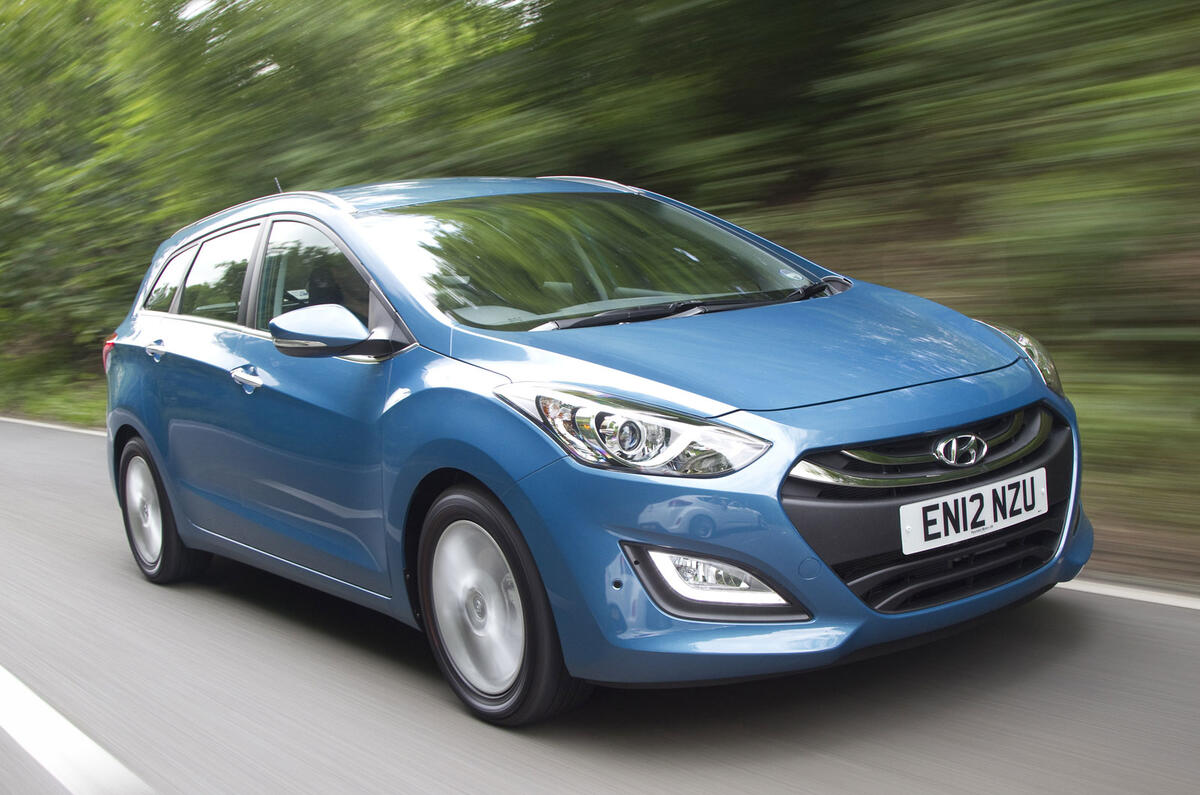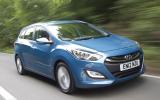What is it?
This is a story about space. Once Hyundai had launched its stylish second-generation i30 hatchback (which it did last March) it was guaranteed that a roomy estate version would rapidly follow.
Hyundai is taking quite some trouble to stress the estate’s space advantages over the already-roomy hatchback: the Tourer is 185mm longer overall (this extra length mostly affecting cabin and load space), offers better headroom front and rear and it has seats-folded luggage volume of 1642 litres. That makes it one of the most spacious C-segment estates going and it beats several D-segment contenders into the bargain. Hyundai UK’s president and CEO, Tony Whitehorn, believes the new model, in showrooms late this month, will account for about 15 per cent of UK i30 deals.
The other major string to the new i30 Tourer’s bow is improved efficiency. The UK is taking three of six engines on offer — a 118bhp, 1.6 litre petrol four and two versions of an enhanced 1.6 four-cylinder turbodiesel, producing either 108 or 126bhp but with identical torque outputs. All improve on the fuel consumption and CO2 emissions of the outgoing model but the star performer is the 108bhp Blue Drive diesel whose integral stop-start system helps it to a combined fuel consumption figure of 64.2mpg, and with CO2 emissions of just 110g/km that bring major tax benefits to company car users.
What's it like?
Our test car, a lower-power diesel, certainly didn’t drive like an economy car. The engine spun willingly and sounded quite sporty, and its 0-62mph acceleration of 11.8sec (plus a 115mph top speed) made it decently brisk for a family car, especially since it pulled lustily in intermediate gears from below 2000rpm and showed impressive flexibility in town
This i30 is designed in Europe for the European market by a substantially European engineering team, and this market focus shows clearly in the chassis design. The car rides reasonably firmly, with good body control, but stays flat and composed over difficult suburban bumps. It is noticeably quieter in this latest iteration. Best of all, it absorbs bumps quietly, leaving a favourable impression of body rigidity and quality.
Our Tourer’s electric power steering had the adjustable three-rate Flex Steer system Hyundai is feeding into all its cars, but felt best (albeit a little wooden by Golf/Focus standards) in the normal setting. The brakes were light, powerful and easy to modulate. In sum, driving the i30 struck us as low-key fun and better than most models as utilitarian in character as this.
Should I buy one?
Well, the competition is tough. To choose the i30 Tourer you must look past Ford Focus and VW Golf, which are both strong offers. Why should you do that? Perhaps because you like the styling, or the impressive economy strikes a chord. Maybe you’re attracted by the five-year warranty, a particular asset if you sell the car before it elapses.
For us, the Golf probably keeps its position as class leader, but the i30 Tourer deserves the status of a rival that warrants serious consideration.
Hyundai i30 1.6CRDi 110 Active Tourer
Price £17,295; 0-62mph 11.8sec; Top speed 115mph; Economy 64.2mpg; CO2 110g/km; Kerb weight 1326kg; Engine 1582cc, 4cyl transverse; Power 108bhp at 4000rpm; Torque 256lb ft at 1900-2750rpm; Gearbox Six-speed manual



















Join the debate
Add your comment
Who will Koreans kill first?
As Korean cars are getting more and more competitive, I wonder which car companies in Europe will be most effected?
Progress!
Hyundai really have come on in recent years. I worked for a dealer 9 years ago and the difference then and now is amazing.
Residual values are not quite so important if the car is kept long enough. Especially if car was a good deal cheaper in the first place.
Peugeot, Citroen etc could be in trouble. What's that, they already are? Oh yes.
This size of car has always
This size of car has always been a little strange, they did well when there was a panel van variant of the estates - Astra / Focus etc, but now that has faded, relatively few buy a C segment estate, if you need a really good boot you need to go up to the D segment cars, passat etc, which is why a much larger % of D segment cars are sold as an estate variant.
If Hyundai can convince people this has the space of a passat estate rather than a golf then it'll be onto a wineer, but until Hyundai's residual values catch up to its improved build quality they will still struggle a bit, although it seems they are already ahead of the French and Italian manufacturers.